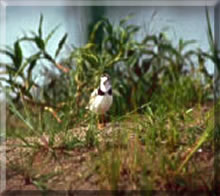 |
 |
||||||||||||||||||||||||||||||||||||||||||||||||||||
|
| |||||||||||||||||||||||||||||||||||||||||||||||||||||
 |
MVS: Piping Plover Recovery on the Missouri River
Partners: USACE; Milwaukee County Zoo; American Zoo and Aquarium Association; US Fish & Wildlife Service; Lake Diefenbaker Corps POC: Casey Kruse, Senior Wildlife Biologist Story: Rescuing endangered piping plovers is the goal of a unique partnership on the Missouri River that increases public awareness of rare and threatened species. The Corps, along with the American Zoo and Aquarium Association, and the U.S. Fish & Wildlife Service, combine resources to achieve this. The partnership includes rescuing piping plover eggs threatened by floodwaters, captive rearing of collected eggs, and displaying piping plovers in exhibits at select zoos across the United States. Global Positioning System (GPS) technology is used to record information on where the birds nest. Then, information on when eggs are laid and hatched, if the nest is in threat of flooding, and where protected area signs are needed is collected. Nearly eight million people annually have had the opportunity to see these charismatic birds and read about the plight of the plover at informational kiosks. Plover Days, Peeper the Plover beanie babies, and the Piping Plover Conservation Fund are all products of this endeavor that are aiding in the efforts to sustain and recover the natural heritage of the Missouri River. These conservation activities assumed a global perspective in 2002 when plover eggs were rescued from the flooded shorelines of Lake Diefenbaker in Saskatchewan. Eggs were retrieved and safely transported to the Corps' captive-rearing facility in Nebraska, where they hatched into 55 healthy chicks. The Canadian chicks will be released to Chaplin Lake, a stable wetland south of Lake Diefenbaker. What our partners are saying: "The Milwaukee County Zoo along with seven other American and Zoo Aquarium Association accredited zoos have worked with the Army Corps of Engineers for the past five years on recovery efforts for the piping plover. This partnership is truly a shining example of what can be accomplished if everyone works together for the benefit of threatened and endangered species." - Kim Smith, Curator of Birds, Milwaukee County Zoo |
|
|||||||
|
| |||||||||

